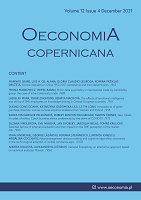Credit cycles and macroprudential policies in emerging market economies
Credit cycles and macroprudential policies in emerging market economies
Author(s): Jelisaveta Lazarević, Tanja Kuzman, Milan NedeljkovićSubject(s): Economic policy, Financial Markets
Published by: Instytut Badań Gospodarczych
Keywords: credit cycle; macroprudential measures; emerging markets;
Summary/Abstract: Research background: Excessive credit expansions have an important role in the generation and amplification of business cycles in emerging market (EM) economies. Macroprudential policies can be beneficial in restraining excessive credit growth and safeguarding financial stability. Despite recent theoretical advances in understanding of the benefits of macroprudential policies, empirical evidence on their effect on the credit cycle is still scarce. Purpose of the article: This paper studies the effectiveness of macroprudential measures in the sample of major EM economies focusing on the broad credit measure and using an empirical framework which aims to alleviate several concerns in the previous literature. We examine the effectiveness of four categories of measures which are granular enough to provide relevant policy perspectives, whilst mitigating data sparsity issues. By exploiting both time-series and cross-country variation in the tightness of macroprudential regulation in the construction of policy variables we also mitigate some of the common reverse causality concerns. Methods: We use panel data and employ several (fixed effect, bias corrected LSDV and dynamic interactive fixed effect) estimators to ensure that the results are not sensitive with respect to the estimation method while, together with our construction of the policy variables, alleviating other endogeneity concerns. Findings & value added: We uncover the heterogeneity in the effects of macroprudential measures on the credit cycle. While measures related to bank capital and credit activity are found to be effective in leaning-against the credit cycle, the measures targeting bank liquidity and FX exposures fail to have statistically significant effect. Our results provide the rationale for mixed evidence in the empirical literature studying the effectiveness of the broadly defined macroprudential measures. From the policy perspective, our findings provide evidence that the measures which address excessive credit expansion and strengthen the resilience of the financial system are effective in the EM economies.
Journal: Oeconomia Copernicana
- Issue Year: 13/2022
- Issue No: 3
- Page Range: 633-666
- Page Count: 34
- Language: English

